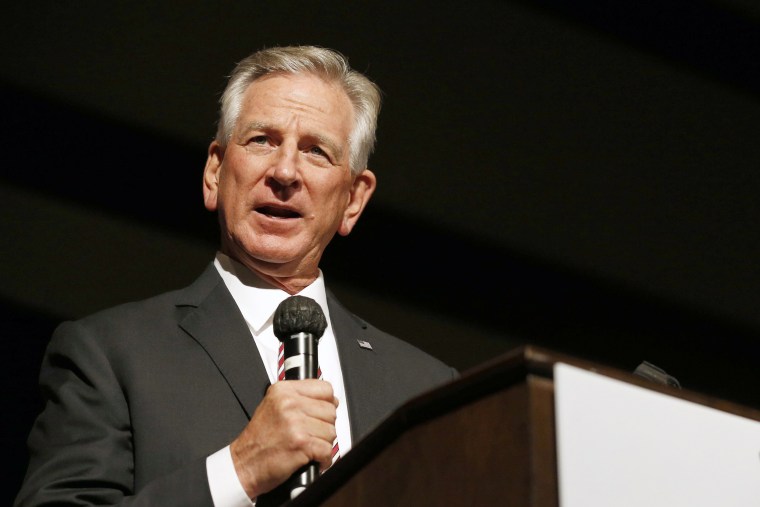Former college football coach Tommy Tuberville (R) was recently sworn in as Alabama's newest U.S. senator. Three days later, an insurrectionist mob attacked the U.S. Capitol, and once the rioters were cleared, Tuberville cast his first-ever votes as a policymaker: the Republican voted twice to reject certification of Joe Biden's victory, despite American voters' verdict.
This week, the new senator spoke to WIAT, a CBS affiliate in his home state, and questioned the timing of Joe Biden's presidential inauguration next week. Here's what the report, published Wednesday, said:
"We probably could have had a swearing-in and inauguration later after we got this virus behind us a little bit. Again, we're talking about Washington, D.C.," Tuberville said. However, the 20th Amendment to the Constitution requires that the inauguration and swearing-in of a new President take place on January 20th. It wasn't clear if Tuberville was aware of that during the interview.
Biden's swearing-in date wasn't chosen at random; it's literally in the Constitution that the senator swore to uphold. When Tuberville said the nation "probably" could've delayed the inauguration until after the pandemic is "behind us a little bit," he described a scenario that is both odd -- the coronavirus crisis is nowhere near its end -- and in conflict with unambiguous constitutional language. [Update: see below.]
Some context is probably in order. As regular readers may recall, Tommy Tuberville was a unique kind of U.S. Senate candidate. The Republican settled on a campaign strategy that Americans generally don't see among those seeking statewide office: say very little, do very little, and expect to win by maintaining a relatively low public profile.
During the state's GOP primaries, for example, Tuberville refused to debate former Attorney General Jeff Sessions. During the general election, he also refused to debate then-Sen. Doug Jones (D). After struggling to discuss what the Voting Rights Act is, the retired coach seemed to retreat even further from microphones.
In mid-October, the Alabama Media Group's Kyle Whitmire noted, "With three weeks left before the election, Tuberville's campaign strategy is to say as little as possible. No debates. No interviews. No nothing. Tuberville is in hiding." The columnist added, "[I]f a campaign won't let its candidate speak openly because he can't do so without saying dumb things that hurt his chances of winning the election, what the heck is going to happen when he's in the United States Senate?"
None of this seemed to matter too much to voters in Alabama -- Tuberville won in a landslide -- and as he prepared to take office, the Republican raised new doubts about his competence with comments to the Alabama Daily News' Todd Stacy, arguing that World War II was about "freeing Europe of socialism." (It wasn't.)
In the same interview, Tuberville added, "You know, our government wasn't set up for one group to have all three of branches of government. It wasn't set up that way, our three branches, the House, the Senate, and executive."
In the United States, the three branches of government are the legislative, the judiciary, and the executive.
Now, the Alabama Republican also appeared confused about the inauguration of American presidents.
This does shed some light on why Tuberville avoided debates and interviews ahead of his successful election victory.
Update: Though the report from the local CBS affiliate has not been changed, some have made the case that what Tuberville actually said was, “We probably could have had a swearing in and done an inauguration a little later on after we’d got this virus behind us a little bit.” In other words, he described a formal swearing in on Jan. 20, followed by a ceremonial event later.
That's obviously a fundamentally different quote, different from WIAT reported. I've therefore changed the headline on this post.

